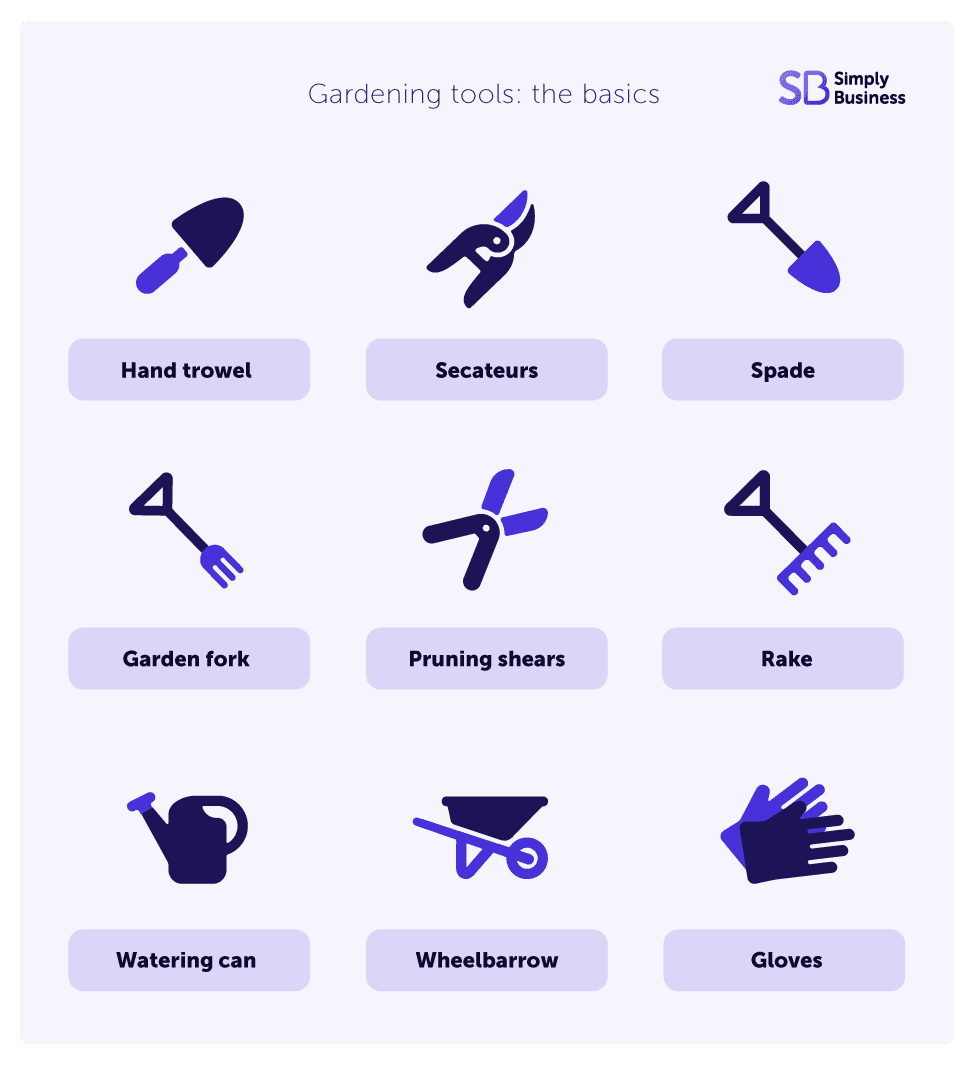How to start a gardening business: a step-by-step guide
6-minute read

Do you love the idea of working outside and being your own boss? Maybe even employing other green-fingered people in a thriving business? If the answer's 'yes' then growing a gardening business could be the right path for you.
If you’re not sure where to start, read our nine-step guide to becoming a gardener below.
Spring prompts many people to think about getting their gardens into shape, which makes the next few months a good time for setting up a gardening business.
Starting a gardening business in 9 steps
The UK is a nation of gardeners – professionals as well as hobbyists. According to Simply Business data, 2023 saw an 11 per cent growth in garden maintenance businesses.
If you love the idea of being outside (all year round) and are prepared for physically tiring days, then read our top tips on setting up, marketing, and growing your own gardening business.
We'll also explain some of the practical things you need to do, like organising gardeners insurance and registering a with HMRC.
For a more general guide, read our in-depth article on how to start a business in the UK.
1. Explore gardening business names
First you need to come up with a catchy name for your gardening company. It should be memorable, show your brand’s personality, and help you stand out against competitors. Importantly, make sure the name isn’t already taken by someone else and read up on intellectual property laws.
For some lighthearted inspiration, check out our Business Name Generator.
2. Write your gardening business plan
Writing a gardening business plan will help you decide on the strategic direction of your company, what services you’ll offer, and how you plan to grow. Take the time to understand your potential customers, plan your marketing, and prepare a budget for initial and ongoing costs.
Richard Burle, owner of Richard’s Garden Services based in West Sussex, recommends looking at how competitors operate too.
“Check what prices they charge and identify five good things the company does,” Richard says.
Richard says its also good practice to plan "where you want to be in your first, second, third year and fourth year. For example, the first year I spent by myself working and building up my customer base."
"Then after the first year, I got more people, more customers, and did the odd job on Saturday as well – so I brought on help for that."
“And then in my second year, I got my first contractor for two or three days a week – and after that it just increased,” he says.
.jpg)
3. Fund your gardening business
If you’re already an enthusiastic gardener, you might already have all the equipment you need to start your gardening business. But buying or upgrading gardening tools or investing in a vehicle could cost you thousands of pounds up front. So how can you fund this?
First, take a look at our budget calculator and cash flow forecast guides for help with planning your budget. Then you’ll need to explore the different types of business funding available, such as business loans and business grants. You could also use savings.
4. Choose a legal structure
Before you begin trading, you’ll need to register with HMRC for tax, National Insurance, and possibly VAT.
To do this you’ll have to choose the legal structure your business will take. Many gardeners work alone, making the self-employed business owner/sole trader route the best option. But for a number of reasons, including taking on staff, you might choose to set up a limited liability company or limited liability partnership.
Read more about the differences between sole traders and limited companies.
You might also consider hiring an accountant, opening a business bank account, or using a business accounting app, for example.
Richard wholeheartedly recommends hiring an accountant to help with bookkeeping and annual tax returns.
“I truly think the thing that held me back at the start was wondering how I’m going to do my taxes. It scares a lot of people, it scares everybody who hasn't ever done it before. If you need help with your taxes – always have an accountant rather than trying to save money by doing it yourself.”
5. Design a gardening business card
While we live in a digital world, gardening business cards can still be a great way to advertise your services. You can leave them with potential clients at garden shows or with customers when you quote for a service.
Don’t worry if you lack graphic design skills, there are tools such as Canva and Adobe Spark where you can use templates to create your own business cards and marketing materials.
6. Build a client base
Put time and effort into your marketing and advertising, both online and offline, and you’ll start seeing your client base grow.
Having a business website means customers can easily find out about you and the services you offer. You can also make a business profile on Google for free – this means your company will be easily spotted on Google maps and in search results.
Pay-per-click advertising and search engine optimisation (SEO) will help bring customers to your website. People love looking at plants and flowers and learning gardening tips from social media, making this a great marketing tool for gardeners.
Don’t underestimate the power of traditional marketing either, even word of mouth. You could distribute flyers to houses with gardens in your neighbourhood and advertise in garden centres and shops.
Along with residential gardening, you could explore whether local authorities, commercial properties, and holiday lets need gardening services too. Once you have a list of contacts, you can keep customers updated with any new services or seasonal recommendations for their gardens.
Read our full guide on how to market a small business for more information about social media, email marketing, SEO, content marketing, reviews, networking, and traditional marketing.
7. Get gardeners insurance
Sorting out public liability insurance for your gardening business should be high on your priority list. This can cover you if you injure a member of the public or cause damage to their property.
It's also worth keeping in mind that you're legally obliged to cover any employees – even if they're only temporary – with employers' liability insurance.
Plus if you’ll be using a van to transport tools, other equipment, or flowers and plants, you’ll need business van insurance.
Find out more about tailored insurance for gardeners.
8. Offer a spring tidy-up service
One good way of attracting new clients could be to offer a well-priced tidy-up service for gardens that need some attention after winter. Your spring package could include basics like mowing, trimming and weeding, getting gardens neat and prepped for planting.
9. Go to spring shows (when you can)
Spring usually brings a whole bunch of gardening events across the country, so keep an eye out for something in your local area.
You might want to apply for a stall at different events. Selling your homegrown products or running a workshop can be good ways of promoting your gardening business.
How much do gardeners earn?
In the UK, a professional gardener typically earns between £19,500 to £25,000 a year (according to the National Careers Service). However a gardening limited company owner could earn as much as £66,937 in annual revenue.
Qualifications for professional gardeners
While not essential, a horticultural qualification can give you practical skills and help you stand out to customers. The Gardeners Guild has a range of gardening qualifications and you can also pay for a membership to list your services in their gardening directory.
For more horticulture and gardening courses, you could also look at the Royal Horticultural Society's approved qualifications and work-based learning.
If you're interested in landscape gardening, you might want to look at garden design courses such as this Diploma from the London College of Garden Design.
The Society of Garden Designers has a list of garden design courses. Read more about becoming a landscape gardener.
Another way to develop your skills could be through an apprenticeship.

Tools for a gardening business
The tools you’ll need will depend on the services you’re offering. Landscaping tools for jobs like grouting, tiling, and laying turf will come in handy if that's a service you offer.
“My favourite gardening tool is my dutch hoe,” says Richard. “It’s a long-handled tool and it’s one of my main tools to use. If you don’t have one, you're on your hands and knees in all weather. You can do so much weeding – it’s an incredible tool”.
As you'll be out in all weathers, you'll need a pair of good boots, micro fleeces, and waterproof jackets and trousers. You might also need compost, lawn care products and plants if you offer landscaping services.
Larger equipment such as lawn mowers and hedge trimmers can be hired if you’re just starting out. Whether you're hiring tools or have your own, make sure you have tool insurance to protect you if your tools are lost or stolen. Most importantly, you’ll need a van to transport all of your equipment between clients.
Remember, a gardening business takes time to grow
You're not going to see instant success with any business. So take the time to lay the foundations of your gardening venture, from market research to branding. You'll then be ready to start building (and nurturing) your clients over the coming months and years.
Do you have any unanswered questions about how to set up a gardening business? Let us know in the comments.
More small business guides
Insure your gardening business
Over 800,000 UK business policies and a 9/10 satisfaction score. Why not take a look at our specialised gardening insurance - including the likes of public liability insurance and tool cover - and run a quick quote now?
Start your quote
Written by
Catriona Smith
Catriona Smith is a content and marketing professional with 12 years’ experience across the financial services, higher education, and insurance sectors. She’s also a trained NCTJ Gold Standard journalist. As a Senior Copywriter at Simply Business, Catriona has in-depth knowledge of small business concerns and specialises in tax, marketing, and business operations. Catriona lives in the seaside city of Brighton where she’s also a freelance yoga teacher.
We create this content for general information purposes and it should not be taken as advice. Always take professional advice. Read our full disclaimer
Keep up to date with Simply Business. Subscribe to our monthly newsletter and follow us on social media.
Subscribe to our newsletterInsurance
Public liability insuranceBusiness insuranceProfessional indemnity insuranceEmployers’ liability insuranceLandlord insuranceTradesman insuranceSelf-employed insuranceRestaurant insuranceVan insuranceInsurersAbout
About usOur teamAwardsPress releasesPartners & affiliatesOur charitable workModern Slavery ActSection 172 statementSocial mediaSite mapAddress
6th Floor99 Gresham StreetLondonEC2V 7NG
Northampton 900900 Pavilion DriveNorthamptonNN4 7RG
© Copyright 2024 Simply Business. All Rights Reserved. Simply Business is a trading name of Xbridge Limited which is authorised and regulated by the Financial Conduct Authority (Financial Services Registration No: 313348). Xbridge Limited (No: 3967717) has its registered office at 6th Floor, 99 Gresham Street, London, EC2V 7NG.